|
“Jesus allows himself to be found by those who seek him, but to find him we need to get up and go.” -Pope Francis I remember getting up in the middle of the night years ago to try and glimpse a rare, hybrid, solar eclipse. My husband and I camped out at the Lincoln Memorial in the wee hours of the night with blankets and hot chocolate to wait for a rising sun that would be covered by the moon. Rich pink and orange hues danced across the sky, basking the surrounding monuments. Though there were clouds that day, we knew something mysterious and magical was happening above us. We were willing to sacrifice some sleep and wait in the cold just to catch a glimpse of that star. What did the magi see when they looked up in the sky over two thousand years ago? It was enough not only to make them camp out in wonder, but to set out in haste. Their journey required provisions, logistics, time, and great effort. But something in the sky beckoned them. I imagine it was similar to what Peter, Andrew, James and John saw in the face of Christ calling them on the beach – something so extraordinary and captivating that it called them out of their day-to-day routines to begin a new journey. Both the journey of the magi and that of the first apostles had the same end: Jesus Christ. These journeys show that an encounter with Jesus is life-changing. It sets us in motion: the journey of the magi, the life of discipleship and evangelization. This past Sunday, the Christmas season continued with the celebration of the Feast of the Epiphany. The Gospel reading recounted the journey and visitation of the magi to the Christ-child. As the Catechism of the Catholic Church states, “The Epiphany is the manifestation of Jesus as Messiah of Israel, Son of God and Savior of the world. the great feast of Epiphany celebrates the adoration of Jesus by the wise men (magi) from the East, together with his baptism in the Jordan and the wedding feast at Cana in Galilee.” The birth of Christ is the first outward manifestation of the Messiah. Jesus, whose name means “God saves,” is the revelation of God’s plan of redemption. After years of prophecy and expectation, longing and promise, God comes in the midst of his people in the most intimate way possible: as one of them. This Incarnation is awe-inspiring. So awe-inspiring, in fact, that it even draws strangers. The Messiah foretold was long-awaited by the Chosen People of God—the Israelites. And yet, how many do we see at the birth of our Lord? The Visitation of the Magi foretells the inclusion of the entire world in God’s plan of salvation. He has come not only to redeem Jews, but Gentiles—peoples of every land and nation. As Paul wrote in Sunday’s second reading, “the Gentiles are coheirs, members of the same body, and copartners in the promise in Christ Jesus through the gospel.” What can we learn from the magi? In his homily on the Feast of the Epiphany last year, Pope Francis boiled it down to 3 things:
Let us imitate the magi in our lives of discipleship. They were not complacent, but so observant that they were able to recognize God’s sign: the star. “The Magi were not content with just getting by, with keeping afloat,” Pope Francis said last year. “They understood that to truly live, we need a lofty goal and we need to keep looking up.” They were vigilant, ready to go when the time came. And their hearts were receptive, disposed to the signs of the times. From there, they set out on a journey which would lead them to Christ himself. This journey required effort, planning, and sacrifice. And finally, they came bearing costly gifts: gold, frankincense, and myrrh. They met the generosity of God by reciprocating generosity. Pope Francis continued, “To give freely, for the Lord’s sake, without expecting anything in return: this is the sure sign that we have found Jesus.” As we reflect on the significance of the Feast of the Epiphany, let us look to the example of the magi in our lives of discipleship. Let us look up beyond the distractions of the world in order to see God’s star. Let us take the risk of setting out on our journey closer to Christ with joy. And let us give generously to a world which needs the generous love and mercy of the Christ-child. Question for Reflection: What are some things in our life that might distract us from seeing God in the everyday? **This blog was originally published on January 8, 2019** **This photo is from: https://www.crossroadsinitiative.com/media/articles/epiphany-of-the-heart/**
0 Comments
Christmas marks the coming of the Christ Child into our world. Gabriel told Mary that the baby she would bear shall be named Emmanuel, meaning “God is with us.” He is faithful and always encounters us where we are. One of the ways the Church communicates this is by turning pagan festivals into Christian ones. The calendar used during the life of Christ was the Julian calendar. According to that, December 25 was the day the winter solstice was celebrated as light began to show more and more after the darkest and longest days. The pagan festival of Juul (Yule) would be celebrated by lighting fires to “symbolize the heat and light of the returning Sun.” In the Church, we not only celebrate the nearness of the sun in the days to come (winter in the Midwest can indeed be long and dreary), but also the nearness of the Son of God who came to embrace those in the darkness. As a baby, God allowed Himself to be embrace-able by us and ultimately sacrifice-able. This intimate vulnerability is exactly what would save us. Indeed, tidings of great joy! If you attend Mass on Christmas Night, you will hear “The people who walked in darkness have seen a great light; upon those who dwelt in the land of gloom a light has shone” (Isaiah 9:1). The world around us can feel dark and desolate, but on Christmas Eve we hear “No more shall people call you ‘Forsaken,’ or your land ‘Desolate,’ but you shall be called ‘My Delight,’ and your land ‘Espoused.’ For the LORD delights in you” (Isaiah 62). How does it feel to hear these words during this Christmas season? We don’t have to search too hard for news that is discouraging. We are facing battles of many kinds and sometimes we feel stuck in the trenches with only a sliver of hope for a ceasefire, let alone a victory. The Good News of the Gospel of St. John proclaims, “the light shines in the darkness, and the darkness has not overcome it” (John 1). Even when we feel defeated, we can wholeheartedly know that we will be victorious when we welcome Jesus into our hearts. Will our hearts be like a crowded inn concerned more with the demands of the world and not aware of who is standing at the door? Or, will our hearts be a humble stable bustling with life and ready for any opportunity to welcome our neighbor? No matter the darkness you feel, see, or experience in life right now, Jesus was born of Mary so that He would feel, see, and experience it all in flesh and bone with you! The Evil One tries to lead us into despair, but we know that Jesus was born to die for us to defeat sin once and for all. Evil can only exist in the dark. When it’s brought into the light, it is exposed and defeated by the Light of the World, the Logos, the Alpha and the Omega, the King of Kings. As you turn on your Christmas lights, light a candle, or make a fire in your fireplace throughout this Christmas Season, remember that Jesus is the true gift that shines light into your life. At my undergraduate commencement ceremony, our speaker quoted the lyrics of a Leonard Cohen song. These words continue to bring me hope when I feel discouraged or broken. “Ring those cracked bells that still can ring. Forget your perfect offering. There is a crack, a crack in everything. That’s how the light gets in.” Imagine the light from the Star of Bethlehem streaming through the cracked walls of the stable on that first Christmas. Let’s be on the lookout for the Light of Christ shining through the cracks in our hearts so we can reflect that light for others. Merry Christmas! **This photo is from: http://www.intothedeepblog.net/2016/01/bethlehem.html**
Advent, the word in and of itself instills hope and builds anticipation for greatness, joy and peace. What is it are we waiting for? It seems with the close of the year, we wait anxiously for those intimate times with our family and friends, a break from work and the routine and a time for closeness. Maybe, we are waiting for a Christmas party, presents and the holiday ambience. As a student, I always find it paradoxical that finals would be during the season of Advent. The hectic study and preparation of exams easily muddles the preparation I could be doing in my own heart for the King. The anticipation, the excess and busyness I find myself in reminds me of the Gospel story where the disciples forget the presence of the Lord in their midst: “And behold, there arose a great storm on the sea, so that the boat was being swamped by the waves; but [Jesus] was asleep. And they went and woke him, saying, ‘Save us Lord; we are perishing.’ And he said to them, ‘Why are you afraid, O men of little faith?’ Then he rose and rebuked the winds and the sea; and there was a great calm” (Matthew 8:23-26). Looking without eyes of faith, the disciples found themselves in a panic and disarray. With a focus on the storm and on the circumstance that assailed them, the disciples forgot the most essential truth that was right there with them on the boat: the Sleeping Christ. The answer to their cries for help was peacefully present in their situation ready to grace them with a great calm. What is it, again, that we are waiting for during this Advent Season? The gift we are waiting for is the sleeping babe, the sleeping Christ, in the manger. The Divine Son, who humbles Himself so greatly that He arrives in the stillness of night, in the quiet with shepherds and sheep alike. The Creator God comes in the stillness. What we are waiting for is the Prince of Peace. My own hurriedness in finishing all of my papers and exams, finding the perfect gifts for my friends and family, making travel plans and somehow finding time to stop and recognize where I am headed resembles the experience of the disciples. I am awaiting His peace, but my actions reveal otherwise. I must intentionally make the effort to stop and breathe in what I am truly searching for this December. May the anticipation throughout this Advent season bring us to stop and ponder the mystery of the Lord of the Universe resting in a manger who has come to encounter our hearts. May the peace of the Sleeping Christ invade our hearts, our minds, and our actions so we too may accept the true gift He wishes for us all this season: a great calm (Matthew 8:26). **This blog was originally published on December 12, 2015.** **This photo is from: https://thejesusquestion.org/2011/12/25/nativity-paintings-from-around-the-world/** 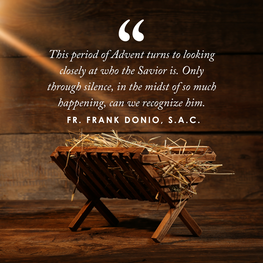 On the cusp of Christmas, our lives can be so full of doing this and that. It is usually not a time of silence and contemplation. And yet, the most famous Christmas hymn is Silent Night. It is worth considering that night that we will remember in only a few short days. This period of Advent turns to looking closely at who the Savior is. Only through silence, in the midst of so much happening, can we recognize him. Pope Francis offers us these considerations: “We can ask ourselves: What place does silence have in my days? Is it an empty, perhaps oppressive, silence? Or is it a space for listening, for prayer, for guarding my heart? Is my life sober or filled with superfluous things? Even if it means going against the tide, let us value silence, sobriety and listening. May Mary, Virgin of silence, help us to love the desert, to become credible voices who testify to her Son who is coming” (Angelus, December 10, 2023). The questions asked by Pope Francis are good ones to meditate on in these last days of Advent. Entering into listening and prayer, we can hear God’s voice more clearly. The voice of the One who comes into the world as Prince of Peace and sends us forth to testify to the world our faith in him. May the Charity of Christ urge us on! The Catholic Apostolate Center team is keeping you in special prayer during the Advent and Christmas seasons. May you have a blessed Christmas and a faith-filled New Year! In God, the Infinite Love, Fr. Frank 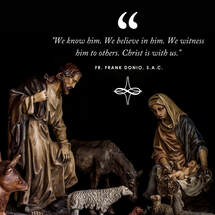 Christmas approaches. We are nearly through our Advent waiting. What has this time been for us? As we enter the joyful season of celebration of the Incarnation, we have an opportunity to embrace the humble simplicity of the scene. Only the shepherds were made aware on that night and came to adore. As St. Vincent Pallotti notes, it was as God wanted it to be. “Our Lord Jesus Christ, according to the instructions and signs given to the shepherds, allowed himself to be found as a child wrapped in swaddling clothes, and laid in a manger” (OOCC, II, 66). Eventually, those with faith in him came to know him as Emmanuel, God is with us. We know him. We believe in him. We witness him to others. Christ is with us. May we proclaim him as the angels did to the shepherds! Please know that the prayers of the Catholic Apostolate Center team are with you at Christmas and always. May you have a blessed Christmas! In God, the Infinite Love, Fr. Frank The Advent and Christmas seasons are some of the most important times in our Church. We are celebrating the arrival and birth of Jesus, our Savior! As we go through these seasons, families have different traditions that they partake in throughout this special time. These traditions help to bring us into a preparatory state for the birth of Jesus. If you want to implement some additional practices into your family's Christmas preparations and traditions, here are some ideas that can get you started.
These small practices not only highlight the importance of the Advent and Christmas seasons for your family, but they can also create lifelong traditions that can be carried on through your family. Some of my fondest memories of Christmastime are from the Vigil Mass, participating in the Christmas pageant, and making cookies with my family. I hope that you and your family have a wonderful Advent and Christmas and find time to joyfully anticipate and celebrate the birth of Jesus.
It is just a couple of days before Christmas and the sparkle and bright lights of the season have been adorned in homes, neighborhoods, and towns all over the country for weeks now. Trees are trimmed, lights are hung, special foods baked, festive music plays, and gifts are purchased and wrapped. It is the season of light, but as Christians, are we receiving Christmas or are we giving it? Are we soaking in the bright warmth of all the lights – or are we being lights? The older I get, the more mindful I am of what that first gift of Christmas helps us to be. Christmas is a gift to be received deep in our hearts and then to be shared. The first gift of Christmas is love: love incarnate, love divine. God loved us so much that He sent His only Son to walk with us and instruct us how to be light in a world filled with darkness. Unwrapping the gift of Jesus is our most important mission as Christians. We revel at the manger and are filled with warmth and joy at the birth of a newborn baby. But, we must fully comprehend the entirety of the Christmas story that brings the baby from the manger in Bethlehem to the man who was sacrificed on the hill in Calvary to ransom us from the darkness of our sin. “Why lies He in such mean estate where ox and ass are feeding? Good Christians fear; for sinners here, the silent Word is pleading: Nails, spear, shall pierce Him through, the cross be born, for me, for you; Hail, hail the Word made flesh, the Babe, the Son of Mary.” William C. Dix ‘What Child Is This?’ As we enter into this holy season of light, we celebrate all the richness it bestows in our hearts and souls. Let us not forget amidst the glittery enhancements we have placed on this holiday that it is a sacred holy day- the birthday of our Savior! We receive His love that came down from heaven to earth and we rejoice in the fullness of that gift opening the door to our eternal salvation! When we really grasp the immensity of this gift, we cannot help but want to share it with everyone around us. And how do we live as Christmas lights? We shine with encouragement and support to our neighbor. We sparkle with unashamed exuberance in sharing the Good News of Christ’s saving power. We generously share what we have to those in need. We reach out in flesh and allow the divine to work through us to dispel any darkness that would prevent us from reaching our heavenly inheritance. We embody hope, peace, joy, and love in everything we do. This is how we unwrap the gift of Christmas and be His light to the world. “You are the light of the world. A city set on a hill cannot be hidden; nor does anyone light a lamp and put it under a basket, but on a lampstand and it gives light to all in the house. In the same way, let your light shine before others, so they may see your good works and give glory to your Father in heaven." Matthew 5:14-16 Merry Christmas! 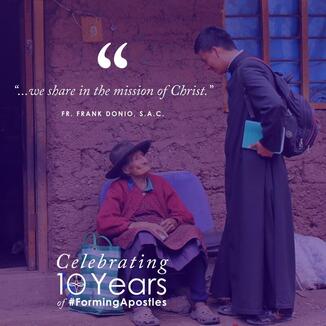 “Each of us – let’s not forget this – has a mission to accomplish. So, let’s not be afraid to ask the Lord: what should I do? Let us ask him this question repeatedly.” – Pope Francis, Angelus, December 12, 2021 What is our mission in life? As Christians, it is obvious, we share in the mission of Christ. That is easy to say, but a challenge to do. What Pope Francis proposes is important, especially about asking the question “repeatedly.” Sometimes we might think that discernment of how we live the mission is something done once or occasionally. Instead, it is a day-to-day discernment and sometimes even moment by moment. “What should I do, Lord?” Consider the question now, then ask it again and again. This deeper portion of Advent, on the cusp of Christmas, provides a perfect time to reflect on what we should do for Christ, with Christ, and in Christ to accomplish well our particular mission. We are not alone in this mission, we might have a unique way to go about it, but the mission is Christ’s. Our sisters and brothers in the community of faith that we call the Church live this mission as well. Let us pray for and support one another as we discern and then live what we should do for the Lord each day. May the Charity of Christ urge us on! May you have a blessed Christmas. Our prayers are with you. In God, the Infinite Love, Fr. Frank During our marriage preparation, my husband and I made a mission, vision, and values spreadsheet for our marriage goals (nerdy, we know!). Part of our goals include living an authentic Catholic lifestyle, which we believe integrates the liturgical season into our new family unit. Some of my favorite memories from childhood include cooking and baking with my mom and having meaningful discussions with my parents about our Catholic faith. Traditions like these are important to my husband and me, and we look forward to continuing to build off of our parents’ traditions while adding our own. To build traditions within our family, we’ve started with the idea of liturgical living. Liturgical living brings the life and breadth of the Church into our own homes and can be accomplished through certain prayers, celebrations, meals, crafts, and other traditions. This can also be described as building up the domestic church – which may be even more important than ever during the Covid-19 pandemic. As newlyweds, we have slowly added liturgical season traditions into our daily lives, such as celebrating saint feast days and preparing our house for Advent and Christmas. A New Year’s resolution we’ve set for ourselves in 2021 is trying to incorporate more of the Church’s liturgical seasons into our home to better appreciate the richness of our Catholic faith. One of our favorite wedding gifts to help us implement our goal of liturgical living is The Catholic All Year Compendium by Kendra Tierney. Tierney shares how her family celebrates the Church’s liturgical season 365 days a year. She starts off the book by encouraging families to begin celebrating what makes the Catholic faith most approachable to each family member – saint namesake feast days and Baptism anniversaries. Special meals and desserts, prayer, stories, activities, and conversations are different ways to make the celebrations meaningful. After noting namesake feast days and baptisms, Tierney recommends starting slowly and gradually, adding in other feast days important to each family and doing things that already fit into existing daily routines. The free calendars given out at church for the new year have these dates with the liturgical year, such as Ordinary Time, Lent, etc. A fabulous Christmas present I also received last month is the Blessed Is She planner that incorporates feast days and the liturgical year. This is all a process that takes time and can be added upon each year or changed. It shouldn’t be meant to overwhelm. In our annual family planning meeting for 2021, my husband and I went through each month and picked which feasts we’d celebrate after our saint name days and baptisms. Our church even made our first feast day celebration easy by providing us blessed chalk and a prayer to say while marking 20 + C + M + B + 21 above our front door mantle for Epiphany on January 6! We’ve also added making “king cake” cinnamon rolls for dessert as part of the tradition. How do you plan to incorporate Catholic liturgical living into your family’s routine this year? What are some of your favorite liturgical living traditions? If you practice liturgical living already, how has this helped your family learn about the Catholic faith? For more resources on Marriage and Family, please click here. We find ourselves approaching the end of a year perhaps unlike any other of recent memory. The turmoil and uncertainty of the past months have presented unique challenges—missing out on time with loved ones, in-person celebrations, socializing freely, and carrying out our normal routines. With all this adjustment, perhaps we have had to face challenges to our faith, our hope, and our spirits. Nevertheless, the faithful can assuredly find renewal and peace in the Christmas season as we celebrate God becoming one of us in all ways but sin. While we shall always have to face challenges in life, recent events and how society has responded to them can motivate us to re-evaluate where we look to center ourselves and our priorities in life.
The world celebrates Christmas with music, movies, decorations, presents, and other traditions that set it apart from the rest of the calendar year. With the increasing commercialization of Christmas, the true meaning of the season has become obscured. The bright lights, noise, and pressures of the holiday strongly contrast the stillness and the simplicity of what happened two thousand years ago far away in the town of Bethlehem. The Gospels describe various accounts surrounding the mystery of the Incarnation; especially in 2020 we can be confident that the Christmas story continues to have meaning and reminds us of important lessons to keep in our hearts all year long. The world our Lord was born into is vividly recalled, during the Vigil Mass of Christmas, with a reading of the Proclamation of the Birth of Christ from the Roman Martyrology. The setting framed by the author details a world under the rule of the powerful Roman Empire, with God’s chosen people, who are forced to pay regular tribute to a ruler they did not select. By that point, the hope for a liberating Messiah by the Jews had narrowed to an expectation that the Messiah would wage a militaristic campaign and preside over an earthly kingdom of God’s people. It was under these circumstances that the Holy Family finally arrived in the City of David, as observed by Fulton Sheen in The Life of Christ: There was no room in the inn but there was room in the stable. The inn was the gathering place of public opinion, the focal point of the world's moods, the rendezvous of the worldly, the rallying place of the popular and the successful. But there's no room in the place where the world gathers. The stable is a place for outcasts, the ignored, and the forgotten. The world might have expected the Son of God to be born in an inn; a stable would certainly be the last place in the world where one would look for him. The lesson is: divinity is always where you least expect to find it. So the Son of God-Made-Man is invited to enter into his own world through a back door. The adorers who made their way to the Christ-child certainly had their own situations and positions to consider, but they nevertheless left behind their comforts and security to answer a higher calling. The shepherds made haste after the revelation by the angels; the wise men set off on a long journey to seek out the mystery the star guided them to. They came in humility and awe to behold God’s incarnate love in the darkness and stillness of the winter night. The experience was unlike any other in history; they returned to their lives changed by encountering the Lord God Himself. This Christmas season, we may not have a star to guide us through the chaos of the world to the blissful peace of Christ, but the invitation to do Him homage is not diminished. No matter our state in life or the challenges we face, we can be confident that the Lord calls each of us to Himself, rising above our troubles and beyond any comforts the world could offer. We have cause to rejoice! The God Who ordered the universe and made all things good has humbled Himself and entered into this world to save us from our sins and claim us as His own through our faith. We cannot lose sight of this significant truth: the pilgrimage through the world in this life does not end in pointless suffering or hopelessness but in happy reunion with our God for all time. We liken ourselves to the first adorers who could not understand what had been revealed to them, but were so moved by the experience that they returned praising God and sharing what they learned with all they encounter. May our encounter with the Christ renew our hope, faith, and love to be shared with all nations. Glory to the newborn King! Forever and ever, Amen. “God wants to draw close to us, but he will not impose himself; it is up to us to keep saying to him: ‘Come!’ This is our Advent prayer: ‘Come!’ Advent reminds us that Jesus came among us and will come again at the end of time. Yet we can ask what those two comings mean, if he does not also come into our lives today? So let us invite him. Let us make our own the traditional Advent prayer: ‘Come, Lord Jesus’ (Rev 22:20).” – Pope Francis, Homily for the First Sunday of Advent, November 29, 2020 We enter today into the deeper portion of Advent, the time of intensified preparation for the coming of the Savior into our lives. It is a time marked by naming in the O Antiphons during Evening Prayer each day one of the titles of the Messiah in the Old Testament. The time can be moved through quickly or we can be distracted by the many things that are occurring in our lives and in our world. As the pandemic intensifies in the United States and other parts of the world, even with hope of vaccines becoming available, the long winter looms ahead or so it seems. We are not alone, though! Pope Francis reminds us to invite the Lord Jesus into our lives again today and every day. He tell us in Evangelii Gaudium (The Joy of the Gospel): “I invite all Christians, everywhere, at this very moment, to a renewed personal encounter with Jesus Christ, or at least an openness to letting him encounter them; I ask all of you to do this unfailingly each day. No one should think that this invitation is not meant for him or her, since ‘no one is excluded from the joy brought by the Lord’” (3). The joy that Pope Francis is referring to is not manufactured. It is not found in fleeting things but is found only in the eternal God of Infinite Love who loved us into existence, sustains us, provides for us, and gives us hope, peace, and joy. Let us invite the Lord Jesus more deeply into our lives. We need only ask, and he will come! May the charity of Christ urge us on! May you have a good continuation of the Advent season and a blessed Christmas. Our prayers are with you.
A lyric of one of my favorite Advent hymns, “O Holy Night,” shares the simple yet profound posture in which we are called to enter into the Advent and Christmas seasons: on our knees. Perhaps many of us already find ourselves there—either out of reverence or sheer exhaustion. For many, the year 2020 will forever be overshadowed by confusion, darkness, anxiety, fear or stress due to the COVID-19 pandemic. Perhaps you, like me, have just wanted it all to be over. We may feel tired of the masks, the canceled events, the physical distance from our friends and loved ones, uncertain job security, or the fear for our health and for those around us. Our hands are raw from sanitizer. Our hearts are raw from stress and confusion. Pandemic fatigue is real. Is this exhaustion, stress, and confusion similar to what the Jewish people felt as they traversed to their hometowns for Caesar Augustus’ census two thousand years ago? “Where is the Savior foretold by the prophets?” they must have thought. “Where is the king who would overthrow all oppressors and establish God’s kingdom forever? Where is God? And why does he seem silent?” For God’s Chosen People, continued faith and hope must have been a hard choice. For God’s chosen people, continued faith and hope is a hard choice. And it is precisely when we are caught up in our feelings of negativity, sadness, or desolation that we fail to see God at work. Too consumed by looking inward, we forget to look up and see the star. It is precisely for this reason that hardly anyone attended the most important event in all of human history: the birth of the Savior of the World, a child born quietly in the recesses of Bethlehem. So where do we find ourselves? Are we grumbling that God has not done enough to fix our broken situation? Are we stressed about the logistics to get our family to the census? Are we awaiting our own version of the Messiah, making our own golden calves? Do we look back longingly, preferring the slavery of Egypt to the wilderness? Or have we abandoned our relationship with God altogether? Finally, are we on our knees? Mary models this posture with her very life. I cannot help but imagine that she received the news from the Angel Gabriel on her knees. “How can this be?” she asked, greatly troubled at what was said in the midst of the holy and miraculous encounter. Her fiat was only possible because of her posture of humility. This receptivity is what every Christian is called to emulate. This posture in the presence of God is also important because kneeling is a physical reminder of reality: God is God, and we are not. Put another way, God is Creator, we are created. By kneeling in prayer, we enter into a dialogue with God in a posture of humility that reflects the true order of reality. Kneeling is also a posture of vulnerability that manifests our littleness before a great God. This littleness is not belittling, but reveals our true dignity. We have the courage to kneel because, in a sense, God knelt first. As St. Paul reminds us, “He emptied himself, taking the form of a slave, coming in human likeness; and found human in appearance, he humbled himself” (Phil 2:7). How can we then fear to approach such a gentle and humble Savior? If 2020 has taught us anything, it’s that we are not in control. Mary experienced this too. She did not anticipate a virgin birth, losing her Son for three days, or watching her Son’s crucifixion. This lack of human control is the truth regardless, but it’s a reality often obscured by our schedules, appointments, bank accounts, occupations, or social events. And when many of these good things have been stripped from our day-to-day lives, we are forced to reckon with our vulnerability. We are reminded that, ultimately, our Good Father holds us and our world in existence. We fall to our knees. Let us therefore approach Him lovingly this Christmas in this humble posture. Let us honor and reverence Him by offering to the Christ-child all our insecurities, fears, or limitations. I invite you to offer each sacrifice, hardship, or suffering as a piece of straw to warm the Christ-child this season. To look for the guiding star each day that leads us to Bethlehem. To name throughout the day what you are thankful for rather than succumb to grumbling. To spend some time reading Scripture, attending a Mass virtually or in person, sharing food or gifts with the needy, or singing an Advent hymn. To open our hearts to God’s way of doing things rather than grasping for control on our own. To fall on your knees. This season, may we join the shepherds, the wise men, and all the angels and saints in this humble posture filled with breathless hope, joy, and excitement to adore Christ the Lord, the newborn King, the answer to each prayer, the fulfillment of all desire. And may we prepare a full, warm manger for the Christ-child to rest in on Christmas Day. This has been a year of waiting. Waiting for the pandemic to end. Waiting for results of a COVID test. Waiting to figure out if and when we can go back to work. Waiting to see our friends and family. Waiting for our sourdough starter to be ready to bake. Waiting to celebrate important life events. Waiting to have a graduation or to get married. Waiting to memorialize a loved one who has died. Waiting for a vaccine. Waiting for everything to go back to how things were before the pandemic hit. And here we are, this Advent season, waiting. Waiting and preparing for the coming of Christ at Christmas. Waiting, as John the Baptist did in the Gospel. He knew what was coming; he knew that Christ was going to follow him. Our waiting for Christ is a hopeful waiting. A joyful waiting. While we do not know when the pandemic will end, we know that Christ will come to us at Christmas and we know that Christ will come for us at the end of time. We should relish in that joyful waiting while we continue to wait for some semblance of normalcy to return to our daily lives by finding moments of light, of peace, and of personal growth. Focus on Social Justice: This Gospel encourages us to look beyond the current situation to what is to come. In the current pandemic, we are called to do something for those around us and for our world. We can do acts of charity by wearing a mask, social distancing, staying home when we can, picking up groceries for an elderly neighbor, making dinner for someone who is sick, reaching out to a healthcare worker we may know to see how we can help them, and supporting local business. Prayer: Good and gracious God, we know you are with us in our waiting. Help us to be patient in our time of waiting. Help us to trust in you and your great plan for our lives. Help us to find joy in our time of waiting, both in Advent and in the current world situation. Help us to find peace in our time of waiting when it becomes too much to handle or is overwhelming. Amen. Service Suggestion: This week, I challenge all of us (myself, included) to focus your energy of service on yourself in an act of self-care. Self-care is not selfish behavior. It is a way, especially during these trying times, to be able to put our best selves out into the world, to our families, to our friends, to our colleagues, and to those who serve. Take a few moments this week to do an activity that brings you joy, that allows you to appreciate this season of waiting and all of the beauty that comes with that. This reflection comes from the Third Sunday of Advent Reflection of the 2020 Advent Reflection Guide, a collaborative effort with the Catholic Volunteer Network. To view the rest of the guide, please click here.
As we celebrate the Nativity of our Lord Jesus Christ at Christmas, I find myself grateful that the Church has established the liturgical calendar in such a way as to help shake us out of our spiritual complacency. The high-points of the Church year—and the larger Christian experience— are referenced so much in our Faith that we may sometimes find ourselves on spiritual autopilot. Before we know it, we might find that solemnities are immediately upon us (or past us), and we feel that we could have benefited from more spiritual preparation. This year, I was looking for a clear and direct theme I could really focus on as Christmas approached. I came across some writings of Venerable Servant of God Fulton Sheen that called to mind certain details of Scripture that my eyes (and spiritual life) might typically gloss over. Recalling the helpless innocence of the Christ-child ready to be born of Mary, Sheen related Mary and Joseph’s plight in searching for late-night shelter in Bethlehem to the lack of hearts open to God which can offer the King of Kings and Lord of Lords a place to dwell and reign:
[W]hen finally the scrolls of history are completed down to the last word of time, the saddest lines of all will be: ‘There was no room in the inn.’ The inn was the gathering place of public opinion, the focal point of the world’s moods, the rendezvous of the worldly, the rallying place of the popular and the successful. But there’s no room in the place where the world gathers. The stable is the place for outcasts, the ignored, and the forgotten… The lesson is: divinity is always where you least expect to find it. So the Son of God-Made-Man is invited to enter into His own world through a back door.[1] With all the seasonal emphasis on gifts and personal generosity, I am especially touched by that first line and the reality that there was no room made available for the arrival of the long-awaited Son of God. How often do we hear calls to be watchful and ready for the Second Coming of Christ; that is, to be repentant of sin and committed to pursuing holiness? This preparation is what the first part of the Advent season is all about. When we are called before the Final Judgement seat of the Most High, and God Himself shows us what we did or did not do for Him[2] in our earthly encounters with the people in our lives, will we say that it was too difficult or inconvenient to take up what we knew was expected of us? All of the baptized are called to be missionary disciples—people who spread the joy of the Gospel by their very lives. We can bring others into an encounter with the Living God—or at least instill a sense of hope, dignity, and love in those who are in need—in the workplace, at home, in our neighborhoods, in our parishes, and within our families. In doing so, we make room in the inn of our hearts for the Christ-child. Without Christ present in our hearts and at the core of our being, we will find ourselves serving a different master—be it vices, worldly pleasures, fleeting successes or honors, or other vanities. Just as the innkeepers of Bethlehem two-thousand years ago declined to open their doors to the Holy Family, so too do each of us have the choice either to be seduced by the empty promises of the world or to pursue a life of holiness and of speaking the Truth among the doubtful, suspicious, hateful, or unrepentant. This Christmas season, let us allow Christ into our lives in order to bring him to others. Let us preach the Gospel with our lives and seek to always make room for him in the inn of our hearts. Christmas is a time for celebration! We rejoice that the Lord God Himself took on human nature and was born as a helpless Child into the world He created in order to free us from sin and death and invite us to live with Him forever. The occasion of Christmas encourages each of us to be a welcoming soul to the Lord rather than one who closed their doors to the Holy Family that holy night: Joy to the world, the Lord is come! Let earth receive her King! Let every heart prepare Him room. And let it begin with me. Amen. [1] Sheen, Fulton. “Life of Christ” (1954). [2] cf. Matthew 25:40. Today we celebrate the 83rd birthday of our Holy Father, Pope Francis. We thank God for the gift of his life and pray for his continued health and leadership in our Church.
Having a birthday near the holidays must be pretty hard to bear as a child, and maybe even sometimes as an adult. Birthdays are meant to be celebrated, and sometimes they can be overshadowed by other holiday celebrations! My sister has a birthday on Christmas Day and she never seemed to be able to celebrate the same ways I could (my birthday is over the summer). I always felt bad and try to still make it special for her - even now that we are adults. Although we know Pope Francis for his humility and selflessness, I’m sure even he has found it hard to celebrate his special day from time to time. We celebrate birthdays as a way to mark our growing one year older, but I’m sure with a birthday so close to Christmas, his focus has often been on Christ. I would imagine, in his ministry, our pope has reflected on the significance of their birthdays being so close and how he can look to the purpose of the season over his own celebrating. Let’s also reflect on this now. How can we make Jesus’ birthday especially meaningful this year? In what ways can we strive to “celebrate” with Christ? What implications does Christmas have on my upcoming year as I continue to grow in my faith? “The reason for the season” is a common phrase we hear at this time of the year— a helpful little rhyme to keep us thinking about Jesus’ birth. The purpose of the Son of God coming to Earth was to save us all from our own sins, yet we so often confuse this time with shopping deals and stressful holiday travel plans. Our Lord doesn’t need any of that. He doesn’t need physical gifts—he needs our hearts. He doesn’t need perfection—he yearns for our humble, raw, and disheveled selves. He doesn’t need displays of lights and blow-up snowmen—he needs us to shine his light in the darkness. In order to celebrate his birth, we must first put aside the distractions and concerns that keep us away from prayer and peace at Christmas. The meaningful celebrating that we should be doing for Christ isn’t wrapped up with bows and shiny paper, but includes finding time to appreciate and pray about our Lord’s coming. The celebration for an ordinary person may be tied to cake, candles, and presents, but as Pope Francis would likely agree, celebrating Christ comes from the heart. One way I’ve found to celebrate Christ’s birthday amidst the hustle and bustle of the season is by listening to joyful, instrumental Advent and Christmas music. Something about it makes me feel so peaceful and filled with the joy of Christ that I almost prefer it to lyrical Christmas music on the radio or Spotify! Another practice I’ve found to be helpful is focusing on the giving aspect of Christmas. I feel better giving rather than getting things. My favorite way to celebrate the birth of Jesus is to share the gift of the Christmas story with my young Pre-Kindergarten students. Having been blessed to work in a Catholic school, I’m able to share the incredible birth story of Jesus Christ and to teach those beautiful little minds about God’s promise of love to the world. When I sit back and realize the gravity of my role as a catechist to these children, I feel humbled by it. My heart soars, it prepares my soul for Christmas, and I’m reminded of this holy birthday from so long ago in Bethlehem. As we look toward a new year, both for Pope Francis and for us Catholics, we are reminded that Christmas is only the beginning of Christ’s work on Earth. His ministry will begin at a wedding as an adult farther down the line, and his death and Resurrection happen even later than that. We know Christ’s birthday was celebrated by angels sharing the Good News. We know there were shepherds who also heard about Jesus’ birth, and finally three wise men who followed the star to where Jesus was born. This new year has so much faith-filled potential to allow us a chance to listen closely to how the Gospel message tells us to love and to share our love with those we meet. We can show God’s love to all by living out each day as apostles who share the Good News. So today, on this 83rd birthday of our pope, keep him in your prayers. Pray for continued faithful leadership in our Church at this tumultuous time in our world. Pray for his health, that he may find strength in Christ and remain well. Feliz cumpleaños, Papa Francisco! For more resources to accompany you this Advent and Christmas, please click here. |
Details
Archives
July 2024
Categories
All
|
About |
Media |
© COPYRIGHT 2024 | ALL RIGHTS RESERVED

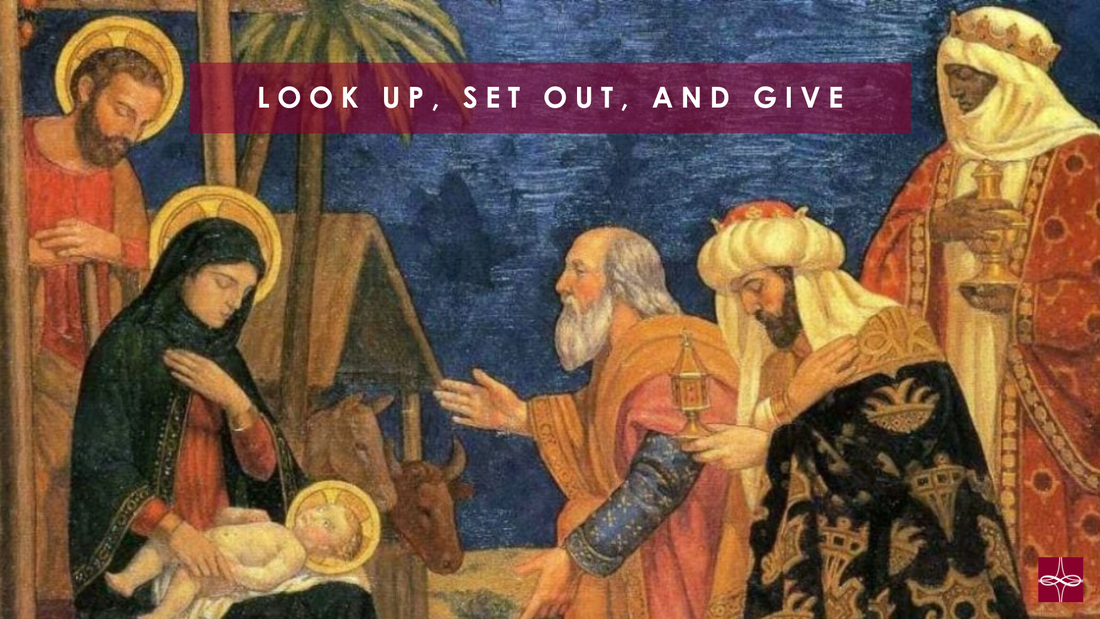

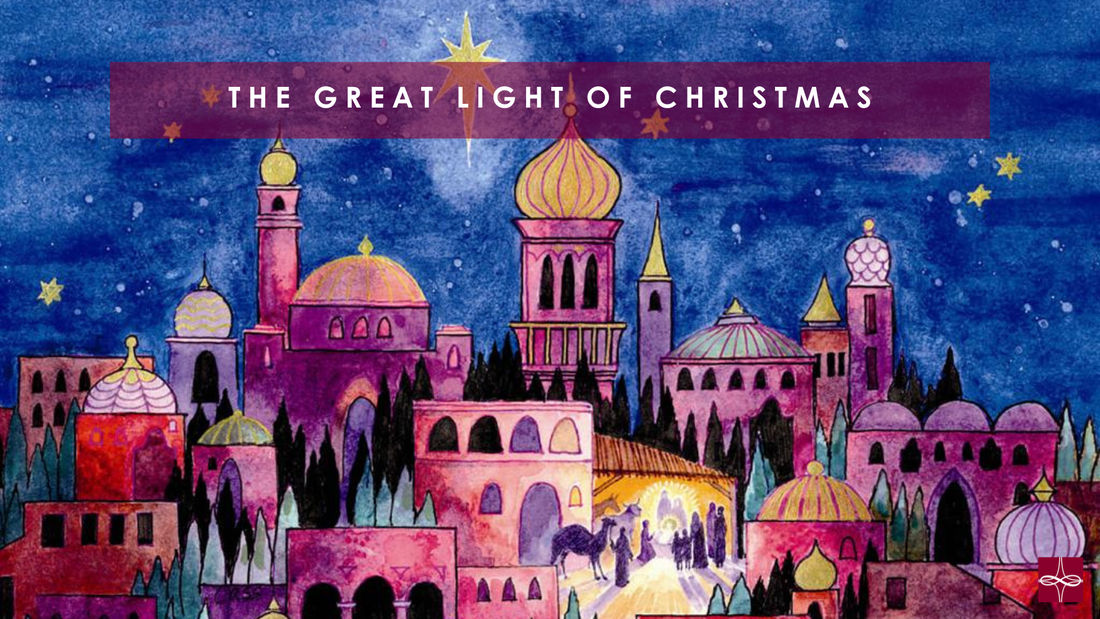
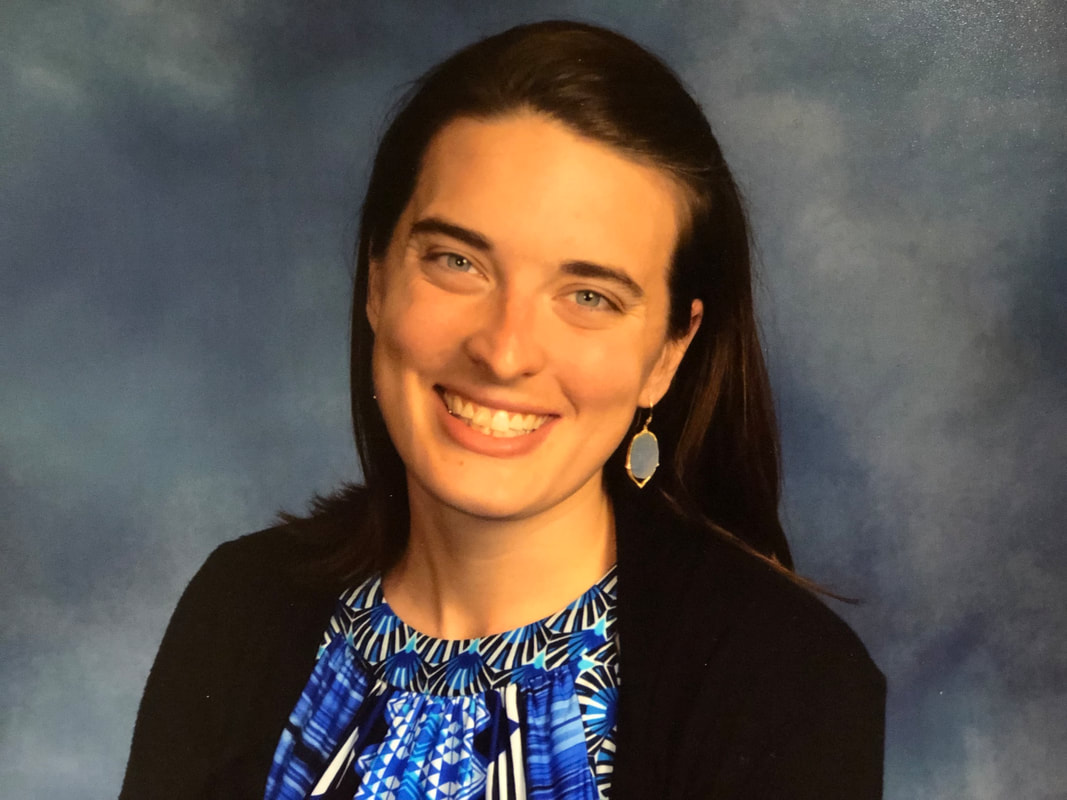
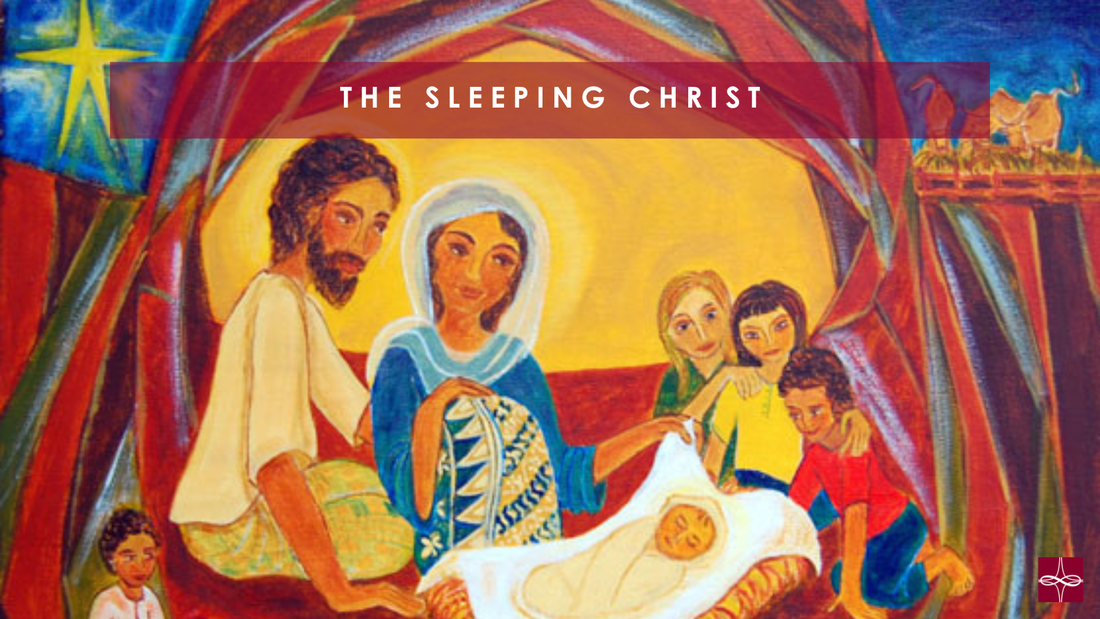

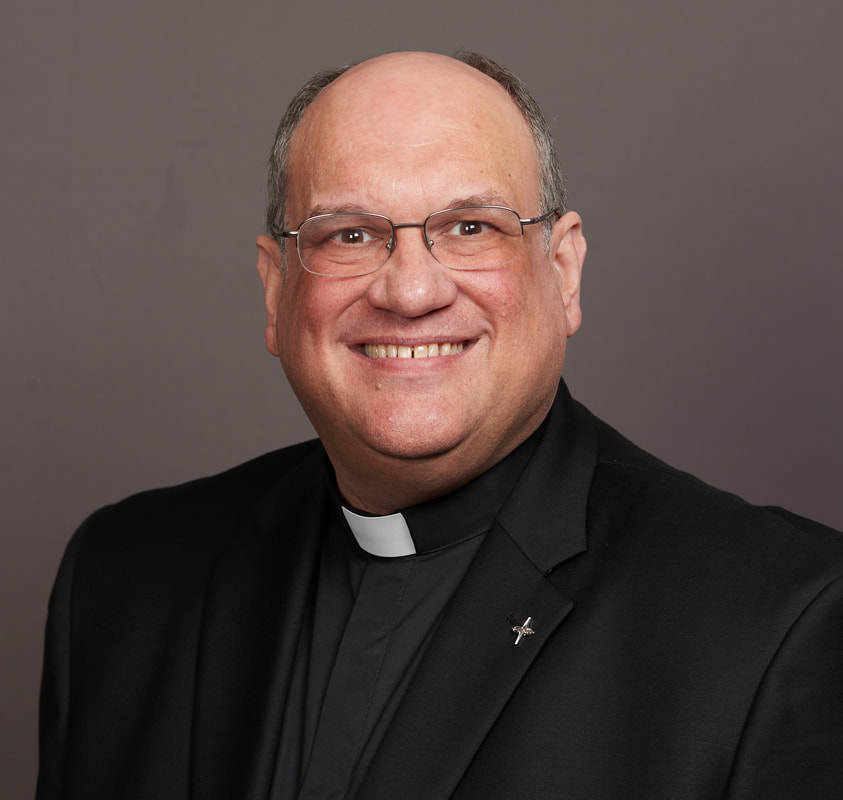
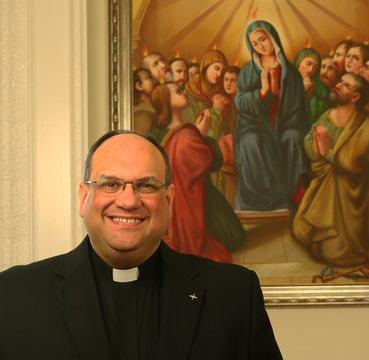


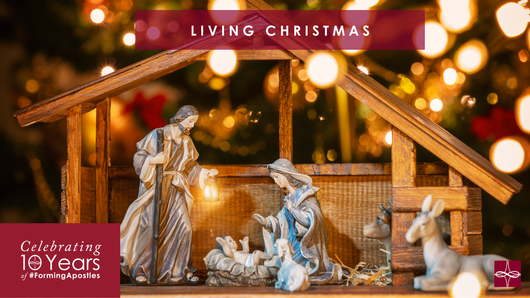

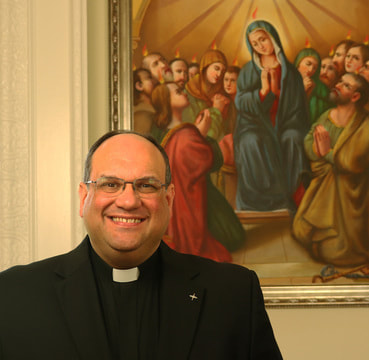
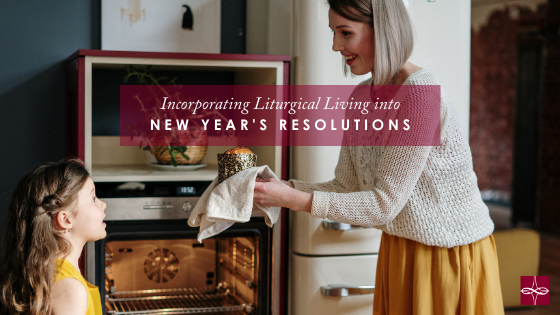

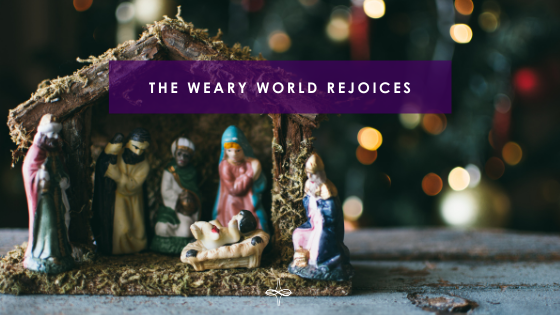

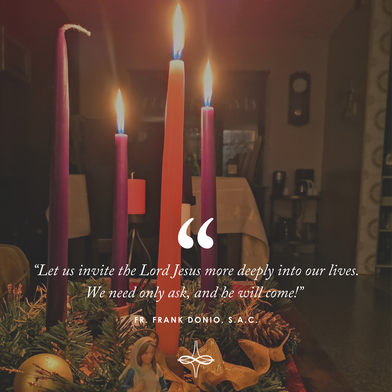
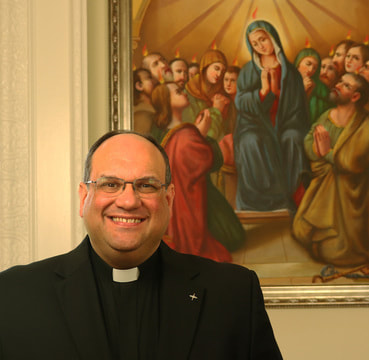
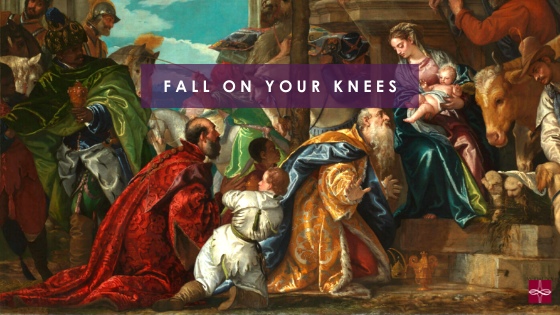

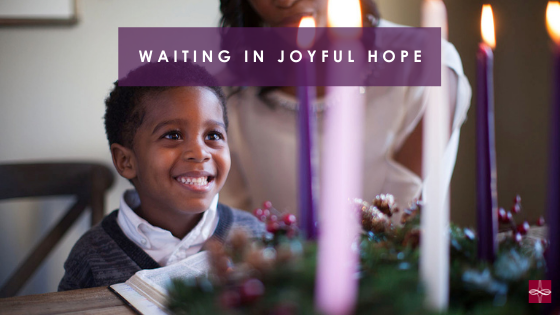
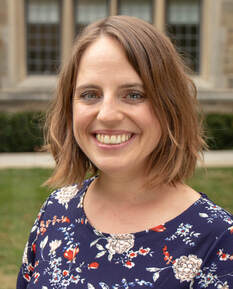
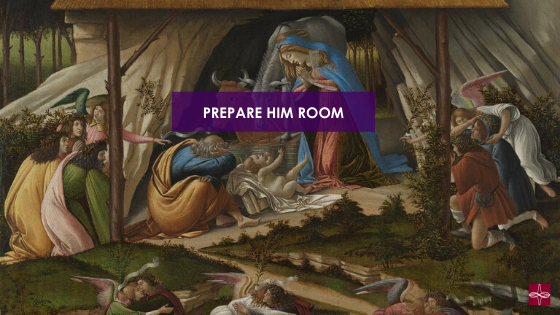

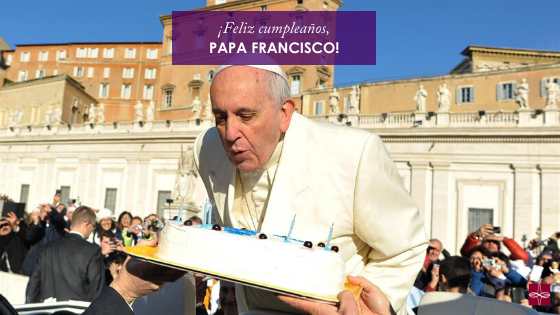

 RSS Feed
RSS Feed